The 4th Corporate Social Responsibility at MAHAK In Commemoration of Childhood Cancer Day
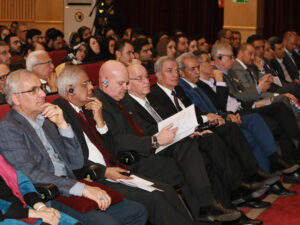 The 4th International Congress on Corporate Social Responsibility was organized by MAHAK, the Society to Support Children suffering from Cancer, on the occasion of International Childhood Cancer Day (ICCD) and in line with the previous activities of Union for International Cancer Control (UICC)’s Campaign for World Cancer Day (WCD) on February 13, 2017 at MAHAK amphitheater.
The 4th International Congress on Corporate Social Responsibility was organized by MAHAK, the Society to Support Children suffering from Cancer, on the occasion of International Childhood Cancer Day (ICCD) and in line with the previous activities of Union for International Cancer Control (UICC)’s Campaign for World Cancer Day (WCD) on February 13, 2017 at MAHAK amphitheater.This congress was held with professional and financial support of both Iran and Tehran Chambers of Commerce, Industries, Mines and Agriculture and scientific support of Amirkabir University of Technology, Sharif University of Technology and Iranian Business School (IBS) under the theme of ‘CSR: Best Practices in Civil Society Initiatives’ with the presence of prominent experts, business executives and economic agents.
Best Practices in Civil Initiatives
During the past three CSR congresses held with the presence of national and international experts, MAHAK reviewed the Corporate Social Responsibility concept from three different points of view including ‘academic approach’ with focus on value chain, ‘standard approach’ focusing on sustainable development, and ‘business approach’ focusing on strategy developing. Consequently, the 4th CSR congress was held focusing on ‘Best Practices in Civil Society Initiatives’ with main themes of application of CSR in organizations, Strategies and policies, Challenges, Secrets to Success, Creating Culture and Best CSR practices and recommendations.
This congress contained three main sections of honorary speeches, introduction of best CSR practices in different organizations and theoretical approaches towards CSR.
MAHAK’s Efforts in Converting the Concept of CSR into Practice
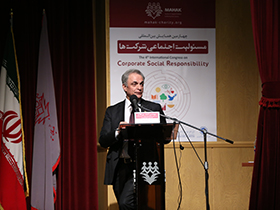 The congress started officially by the secretary of the congress’s speech in which the participants received MAHAK performance report. Welcoming the audience for their presence, he stated:”Due to population growth, increasing challenges in the society and industrialization we are facing a transition from traditional to a systematic approach towards charity activities and helping fellow human beings. Population growth leads to an increase in different challenges, and it cannot be expected from the governments to solve all the problems and issues; these are the private sector and NGOs that should be involved with these kind of issues.”
The congress started officially by the secretary of the congress’s speech in which the participants received MAHAK performance report. Welcoming the audience for their presence, he stated:”Due to population growth, increasing challenges in the society and industrialization we are facing a transition from traditional to a systematic approach towards charity activities and helping fellow human beings. Population growth leads to an increase in different challenges, and it cannot be expected from the governments to solve all the problems and issues; these are the private sector and NGOs that should be involved with these kind of issues.”The head of Iran-Italy chamber of commerce, Ahmad Pourfallah, noted that the concept of social responsibility is stemmed from this transition and continued its progression so far to the extent that different chambers of commerce, the center for entrepreneurs and economic agents have focused on creating the values of the concept of social responsibility.
Member of board of trustees and senior advisor of MAHAK’s board of directors declared that MAHAK is an organization established with the superior motive to serve humankind with the mission of supporting children suffering from cancer. Focusing on the concept of ‘Corporate Social Responsibility’, MAHAK ensures that cancer-stricken children’s families have no concerns but their child treatment process and that the children with cancer can handle their treatment process with more content and hope.
He stated: ”MAHAK always striven to drive business entities’ attention to social responsibility and its promotion systematically in the society from its first Strategic Plan developed in 2010. MAHAK steadfastly supports parents with cancer-stricken children and provide them with integrated support and treatment services all over the country along with the neighboring countries. Institutionalizing and creating the culture of social responsibility are among MAHAK’s main concerns who attempts to guide other charity organizations that share a similar concern regarding Social Responsibility to develop systematic and practical methods for instilling the culture of corporate social responsibility among corporate entities.
Secretary of the 4th International Conference on Corporate Social Responsibility concluded his speech by reminding the participants that business entities can reduce the pain among people specially children and their families by considering corporate social responsibility projects in their strategic plans.
Institutionalization of CSR in the society will solve the management problems in health sector
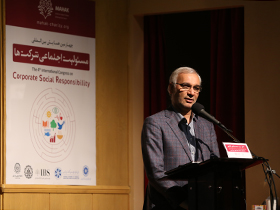 Seyed Mohammad Hadi Ayazi, deputy minister and the chairman of the head-quarter for the social determinant of health in the Ministry of Health and Medical Science, as the first honorary speaker appreciated MAHAK for holding this conference and its approach towards community’s health issues. He mentioned the necessity of involvement and participation of the society in health factors which has been recently brought into consideration by Ministry of Health and Medical Science. Institutionalizing this approach in the society will resolve a significant portion of health system management problems.”
Seyed Mohammad Hadi Ayazi, deputy minister and the chairman of the head-quarter for the social determinant of health in the Ministry of Health and Medical Science, as the first honorary speaker appreciated MAHAK for holding this conference and its approach towards community’s health issues. He mentioned the necessity of involvement and participation of the society in health factors which has been recently brought into consideration by Ministry of Health and Medical Science. Institutionalizing this approach in the society will resolve a significant portion of health system management problems.”He continued: “regarding the health system issues, the government can manage 25 percent of health system issues while the remaining is under management of private sector like NGOs. If individuals and organizations consider social responsibility in their activities, they will play a vital role in 75 percent of different social factors affecting health system. For instance, 27% of the whole donated blood in the country is used in Tehran while 10% is supplied from other cities’. This issue will be solved through launching five new blood donating centers with cooperation of different banks and financial institutions as their corporate social responsibility.“
He reported that “more than 620 NGOs in the country and almost 850 health charities are operative which indicates that individuals have accepted their responsibility to contribute in this regard and organizing such congresses by an NGO like MAHAK has no aim but reminding all members of the society of their social responsibility. Despite of valuable initiatives done by MAHAK, holding the 4th International Corporate Social responsibility and also the last one, remind the business entities that they are responsible to the society.”
He finished his speech by congratulating MAHAK for promoting the concept of social responsibility in the society and wished for a day that all business entities and executive organs will be aware of their social responsibility since their contribution and involvement in this regard will eliminate many of social challenges of health sector such as environmental issues.
Social responsibility is the secret of sustainability in successful organizations
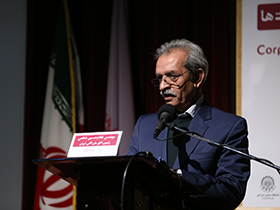 Gholamreza Shafei, head of Iran Chamber of Commerce, Industries, Mines and Agriculture, emphasized on the importance of helping other human beings which is recommended in our culture and said: “Non-systematic charity movements could have never led to sustainable development. What MAHAK is doing in managing, planning and allocating its resources is absolutely a great sample of systematic charity management with remarkable result of providing the best possible service to cancer-stricken children and their families.”
Gholamreza Shafei, head of Iran Chamber of Commerce, Industries, Mines and Agriculture, emphasized on the importance of helping other human beings which is recommended in our culture and said: “Non-systematic charity movements could have never led to sustainable development. What MAHAK is doing in managing, planning and allocating its resources is absolutely a great sample of systematic charity management with remarkable result of providing the best possible service to cancer-stricken children and their families.”He added: “the unique ability of the human kind is to make incredible things possible by the help of normal people. Social responsibility is the secret of sustainability of successful business entities which smooth their way to success and increase their profitability.”
Shafei appreciated MAHAK’s activities regarding social responsibility and said: “MAHAK should be referred as a role model for other similar organizations and philanthropists in the society. MAHAK’s social activities’ investment and implementation leads to sustainable charity activities with considerable and honorable result for all Iranian society.”
MAHAK, A Role Model for Transparency in Financial Reports
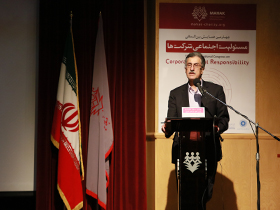 The next honorary speaker was Masoud Khansari, head of Tehran Chamber of Commerce, Industries, Mines and Agriculture who appreciated MAHAK for its comprehensive report regarding CSR concept in the society and said: “it is expected that business entities put social responsibility issue into practice and consider CSR as one of their key performance indicators along with their production strategies.”
The next honorary speaker was Masoud Khansari, head of Tehran Chamber of Commerce, Industries, Mines and Agriculture who appreciated MAHAK for its comprehensive report regarding CSR concept in the society and said: “it is expected that business entities put social responsibility issue into practice and consider CSR as one of their key performance indicators along with their production strategies.”While mentioning the history of CSR among Iranian merchants in ancient times, he added: “during the last decade, charity activities and social responsibility had a reduction in the country due to economic downturn. However there are a lot of business entities and merchants who consider social responsibility as their duty.”
He also referred to Tehran Chamber of Commerce, Industries, Mines and Agriculture’s activities and efforts regarding social responsibility such as re-directing a hospital which has been assigned to governmental sector many years ago to turn it into an equipped one.
He continued: “it is unacceptable to expect governments to solve all the issues in the society because they are also involved with different issues but we hope to witness an increase in business entities’ contributions and cooperation along with the improvement of the economic situation.
He finished his speech by stating: “By publishing its transparent financial statements and its performance report annually, MAHAK works as a role model for alike organizations and NGOs to build trust among people and encourage them for philanthropy activities.”
MAHAK, the Innovator in Promoting CSR among Entrepreneurs
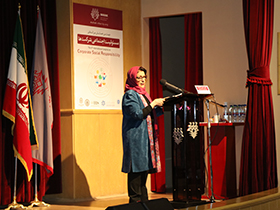 Mansooreh Ettehadieh, the historian, publisher and university professor started her speech by mentioning that MAHAK is organizing such congresses to derive public attention and raising awareness regarding social responsibility among individuals and business entities and said:” social responsibility includes 4 main segments of economy, empowerment, ethics, volunteering and charity activity.”
Mansooreh Ettehadieh, the historian, publisher and university professor started her speech by mentioning that MAHAK is organizing such congresses to derive public attention and raising awareness regarding social responsibility among individuals and business entities and said:” social responsibility includes 4 main segments of economy, empowerment, ethics, volunteering and charity activity.”She added: “the history of social responsibility goes back to the tradition of dedication and humanitarian concerns among Iranians and the merchants. Dedication is not far from the public benefits of social responsibility as it is indicated by studying Qajar and Pahlavi eras which divides charitable approaches into two kinds of ‘traditional’ one focusing on specific activities and income, and ‘sustainable’ one in which charities work on the basis of their article of association, specific goals and board of trustees.”
She added: “After second world war and its recession, dedication spirit was increased by constructing number of schools in the country. Dedication was the secret of sustainability of merchants’ activities during all those days. Later in Pahlavi era, the merchants could attain some of their demands from the government such as establishment of banks, railways, roads, political stability, security and law.”
Ettehadieh continued: “economy modernization happened during the 2nd Pahlavi era due to faster evolutions and durability of family businesses formed in a few previous generations and since transformation of traditional business into a high-tech industry needed changes in merchants’ perspective, the new generation of these businesses were educated focusing on new points of view.”
She did end her speech by saying “As I mentioned before, the tradition of dedication is still continued by entrepreneurs’ efforts and it should be appreciated. But it is important to recognize the positive and practical features of social responsibility and create this sense among individuals and business entities in order to encourage them to participate. Because as the experts mentioned, it benefits companies and the environment both, thus it should not be ignored.”
Creating Value in Communities, the Business Organizations’ Secret to Success
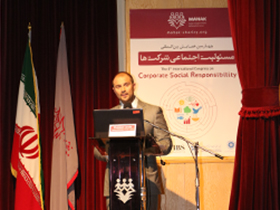 The country manager of Nestle Group in Iran, Giuseppe Carella, congratulated MAHAK for its 25th anniversary and standing to improve the quality of people’s life specially children during these years and mentioned that the initiative idea of founding Nestle Group was helping a child with disability in being breastfed.
The country manager of Nestle Group in Iran, Giuseppe Carella, congratulated MAHAK for its 25th anniversary and standing to improve the quality of people’s life specially children during these years and mentioned that the initiative idea of founding Nestle Group was helping a child with disability in being breastfed.He continued by emphasizing on Nestle Group’s mission of enhancing the quality of life and said:”Nestle Group strives to resolve the concerns and problem existing in today’s life in order to improve the quality of children’s life around the world.” While a video clip was playing during his speech showing Nestle’s core activities, he explained that all Nestle’s programs are set to improve the quality of children’s life leading to eliminating the problems of more than 199 million people around the world. He added: “The main targets of this program are accessing to healthy water for 440 thousand people, enhancing their life quality, sustainable living conditions, job creation and consequently a better future are different aspects of goals realizations.”
He gave a speech on ‘Creating Shared Value’ and said: “shared value is essential for success, expansion and development of any business and since they have a great role in creating value in the society, Nestle also has committed itself to make changes not only in its strategies but also in practices. The concern of society is what we are focused on at Nestle every day.” Then, he played another video clip regarding Nestle’s activities only in one day around the world to demonstrate creating shared value in different communities with tangible examples of the program such as enhancing the quality of children’s life in Malaysia, supplying healthy water in India, Cacao project in Ivory Coast, Nespresso project in France, fortified products in Brazil, and renewable energies in United States of America.
He continued: “In line with realizing its commitments and creating value in the society, Nestle utilizes the best and the most professional human resources and responsible managers to enhance the scale of creating value in the society”. Afterwards, he mentioned Nestle’s programs in Iran in different areas of Nutrition, Rural Development, Water, and Sustainable Energy and stated: “just like MAHAK that is trying to enhance the quality of life among cancer-stricken children, Nestle is determined to share the tangible results of worldwide researches in this regard.”
As the conclusion, Giuseppe Carella referred to the 21 programs which Nestle is committed to implement in Iran in the fields of agriculture, environment and water related issues.
“MAHAK has done a great job in drawing attentions towards CSR after the 3rd CCSR Congress”
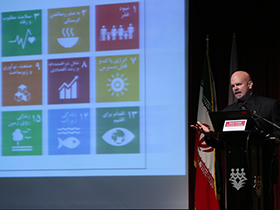 Gary Lewis, UN resident coordinator and UNDP representative in Iran appreciated MAHAK for supporting cancer-stricken children in their treatment process and said: “Since the last time I visited MAHAK at the 3rd International Congress on Corporate Social Responsibility, I witness the growth of this concept in the society by implementing different projects. The universities have also put their efforts into promoting the culture of social responsibility.”
Gary Lewis, UN resident coordinator and UNDP representative in Iran appreciated MAHAK for supporting cancer-stricken children in their treatment process and said: “Since the last time I visited MAHAK at the 3rd International Congress on Corporate Social Responsibility, I witness the growth of this concept in the society by implementing different projects. The universities have also put their efforts into promoting the culture of social responsibility.”Mr. Lewis spoke of the Sustainable Development Goals (SDGs) and highlighted how the private sector plays a fundamental role in advancing the SDGs. In this regards he said: “Although the 2030 Agenda was spearheaded by the UN, it is a global plan. It is an agenda for everyone. One in which all countries are – really – developing countries. Frankly, it is our only real plan to produce a future for our fragile, endangered planet which is sustainable. When the 193 Member States of the UN signed up to this plan in October 2015, what we made was a covenant with the future. We need to succeed with this plan. There can be no Plan B – because we have no Planet B.”
He continued: “what MAHAK is doing for children suffering from cancer is covered with the 3rd SDGs’ goals of healthy lives and promote well-being for all at all ages. Cancer is among the Non-communicable diseases (NCDs) which UN set its target to reduce one third of the number of people died due to them including cancer. Lifestyle and wellbeing has the main role in controlling NCDs which should be in line with UN SDGs by 2030.”
Mr. Lewis added “The 17 goals apply to all countries and all people. Together, they aim to eradicate poverty, fight inequality, build peaceful, inclusive, and resilient societies, and secure the future of the planet and the wellbeing of future generations. Taken together, the 2030 Agenda and its 17 SDGs, represent a shared vision for the future of humanity.”
Mr. Lewis then made reference to the UN’s Global Compact which brings together business, governments, and civil society and UN agencies to advance universal principles in the areas of environment, labor, human rights and anti-corruption. CSR is at the very center of the Global Compact and is the world’s largest voluntary corporate citizenship pact. At present, over 12,200 companies from over one hundred countries participate. There are only 6 members from Iran, 4 Companies and 2 NGOs, one of which is MAHAK.
Competitive advantages and reputation benefits motivates business entities towards running CSR Projects
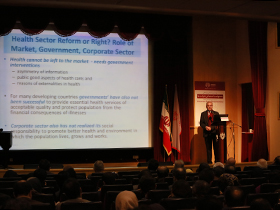 WHO representative in Iran started his speech by addressing the outstanding work of MAHAK for cancer-stricken children regarding ‘Corporate Social Responsibility in the Health Sector, Challenges and Opportunities’ and stated: “the responsibility of different enterprises towards the society is to address consumer concerns into their business operations and collaborate with stakeholders.” He stated:”in many developing countries, governments have not been successful to provide essential health services with acceptable quality.”
WHO representative in Iran started his speech by addressing the outstanding work of MAHAK for cancer-stricken children regarding ‘Corporate Social Responsibility in the Health Sector, Challenges and Opportunities’ and stated: “the responsibility of different enterprises towards the society is to address consumer concerns into their business operations and collaborate with stakeholders.” He stated:”in many developing countries, governments have not been successful to provide essential health services with acceptable quality.”Dr. Sameen Siddiqi mentioned the evolving role of pharmaceutical companies in CSR over the last decade in the area of social marketing, health related issue’s awareness, research and development and said: “what motivates the business entities to get involved in CSR projects are creating reputation, competitive advantages, humanitarian goals and improving health related issues in the society. MAHAK as a pioneer NGOs has a great experience and background in raising awareness and promoting the concept of Corporate Social responsibility.”
Dr. Siddiqi also referred to the SDGs and the aim of WHO working with the Iranian Government to reach universal health coverage within Iran well before the year 2030. He highlighted in his presentation that for CSR to succeed in the health service we require good corporate governance, sound legislation, enforcement and monitoring mechanisms and transparency.
As a conclusion, he added: “raising awareness, collaboration between the governments and business entities and setting progressive bonds among them, policy making and making efforts towards realizing philanthropic goals and developing infrastructures required for integrated activities among NGOs and business entities are different aspects of social responsibility in practice in a civil society.”
MAHAK, the 1st and Only IPMA Award Winner as an NGO
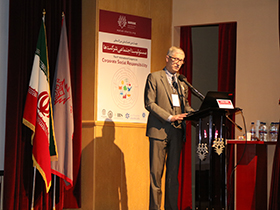 Veikko Valila, IPMA’s former member of executive board, senior consultant and risk manager started his speech by mentioning the recipient of the Gold Award from the International Project Management Association in 2015 and continued his speech in two parts of Climate Change and Social Responsibility. He stated:” the polluted environment is the fatal environment. Air pollution causes many diseases like lung cancer. The governments should use the substantial and sustainable energy resources. The world’s most widely used energy resources are pollutants in addition of being costly, so the priority of governments should be removing the pollutants and reduce air pollutions.”
Veikko Valila, IPMA’s former member of executive board, senior consultant and risk manager started his speech by mentioning the recipient of the Gold Award from the International Project Management Association in 2015 and continued his speech in two parts of Climate Change and Social Responsibility. He stated:” the polluted environment is the fatal environment. Air pollution causes many diseases like lung cancer. The governments should use the substantial and sustainable energy resources. The world’s most widely used energy resources are pollutants in addition of being costly, so the priority of governments should be removing the pollutants and reduce air pollutions.”He added:” The solar energy should be used as a substantial for fossils fuels by 2020 through development of clean technologies, reduction of the risks and dangers due to air pollution and solving the problems of global warming and chemical pollution.
The former member of IPMA’s executive board mentioned that currently in more than 60 countries with low income, the solar energy is the cheapest energy resource and continued: “International Project Management Association (IPMA) endeavors to utilize clean energy technologies and stand up against the opponents of using them.”
He delivered an introduction on circular economic in Finland written for government and private sector which leads to creating annually added value, reducing air pollutants and establishing a sustainable welfare condition. As a member of Climate Leadership Council of Finland he referred to this council’s activities and said: “the most important and well known business entities are members of this council and put their efforts to find a solution for risks and dangers of climate change by emphasizing on utilizing substantial energy resources. The main concern and focus of this council is to clear carbon foot print submitted by United Nation, reduce pollutants and utilize clear energy which has direct relation with improving healthy lifestyles.”
Philanthropy is a part of Enterprises’ Social Responsibility
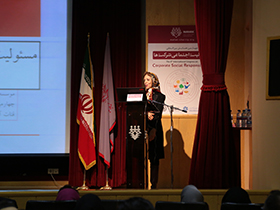 Firoozeh Ghanat Abadi, university professor delivered a speech on two concepts of sustainable and social responsibility among business entities and their progress in line with each other and added: “creating shared value among the society and business entities are the mandatory points of social responsibility.”
Firoozeh Ghanat Abadi, university professor delivered a speech on two concepts of sustainable and social responsibility among business entities and their progress in line with each other and added: “creating shared value among the society and business entities are the mandatory points of social responsibility.”The concept of social responsibility was raised for the first time after Second World War in Harvard University considering the benefits of business entities and capitalism in contrast with Soviet Union.”
She continued: “social responsibility was an option for business entities and there was no pressure and necessity for its implementation. The development of this concept was opposed by proponents of free market economy and led to a conflict between profitability and social responsibility”
After Vietnam War, in 60s and 70s, the movement of women rights and environment problems were raised in the society as trend issues reminding the business entities’ of their duty regarding their social responsibility and also their profitability.”
In philanthropy approach of social responsibility, five paradoxes of ‘inspiration, action-inaction, advertisement, stakeholders and financial supplying’ are emphasized and it should be noted that social responsibility will lead to the progress of business entities’ resources, consequently the quality of entities and level of demands in the society.”
She finished her speech by stating “business entities should be committed to social responsibility since it is a mandatory part of their economic responsibilities.”
Transparency is the secret of sustainability
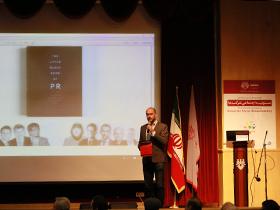 Hubert Grealish, the co-founder of GWorks Media Works and former global head of brand communications at Diageo Brands, ex-Tom Tom, ex-Philips consumer lifestyle, presented his speech on ‘New Rules of Social Entrepreneurship‘ and said:” in the field of social responsibility, we need initiative visions and ideas.”
Hubert Grealish, the co-founder of GWorks Media Works and former global head of brand communications at Diageo Brands, ex-Tom Tom, ex-Philips consumer lifestyle, presented his speech on ‘New Rules of Social Entrepreneurship‘ and said:” in the field of social responsibility, we need initiative visions and ideas.”Referring to the tour he had around MAHAK hospital, he said:”seeing happy children despite of their illness teach us how simple we can work and to what extend we can expand our activities. That is the time we ask ourselves how we can build a better world for children.”
He continued: ”during the last 20 years, after collaborating with various companies and visiting different countries, I came to this result that nothing is more important and more effective than social responsibility on a business entity’s activities. Social responsibility cannot meet success if it has not made positive effects and changes in the society.”
The co-founder of GWorks Media Works, emphasizing on the role of transparency in a business entity, stated: “Transparency and moving forward according to this value, will build trust and validity among the business entities which consequently leads to successful corporate social responsibility projects. The evolution of charitable inspiration to social responsibility in practice is the outcome of sharing knowledge, expertise and the synergy between NGOs and business entities.”
Establishing a ‘Stem Cell Bank’ at MAHAK
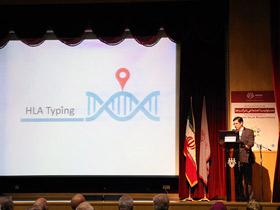 During the 4th International Congress on Corporate Social Responsibility, MAHAK introduced the ‘HLA Typing’ project as one of its successful implemented CSR projects with business entities. Along with the entrance to the new era of operation with management restructuring and transferring its ownership to the private sector, which is considered as a successful example of privatization, Bahman Motors Group has decided to define this cooperation plan with MAHAK. According the Memorandum of Understanding signed with Bahman Motors Group, this company has committed to cover the expenses of conducting HLA Typing for experimenting and generating 5000 donated samples by allocating a specific part of its sales revenue by which ‘the first Stem Cell Transplantation Bank’ has been launched. Dr. Vahid Fallah Azad, MAHAK’s Lab Director, and Saba Kamkar, the Manager of MAHAK’s Public and International Relations Department, had a joint speech on this topic.
During the 4th International Congress on Corporate Social Responsibility, MAHAK introduced the ‘HLA Typing’ project as one of its successful implemented CSR projects with business entities. Along with the entrance to the new era of operation with management restructuring and transferring its ownership to the private sector, which is considered as a successful example of privatization, Bahman Motors Group has decided to define this cooperation plan with MAHAK. According the Memorandum of Understanding signed with Bahman Motors Group, this company has committed to cover the expenses of conducting HLA Typing for experimenting and generating 5000 donated samples by allocating a specific part of its sales revenue by which ‘the first Stem Cell Transplantation Bank’ has been launched. Dr. Vahid Fallah Azad, MAHAK’s Lab Director, and Saba Kamkar, the Manager of MAHAK’s Public and International Relations Department, had a joint speech on this topic.Saba Kamkar while giving a short background of the past 25 years of MAHAK’s activities and development stages mentioned: “MAHAK as a pioneer charity in the concept of social responsibility believes that it as its duty to spend the resources and received funds from individuals and business entities in a right way in order to expand its services provided for children suffering from cancer and their families.”
She also referred to being ranked as 4th among 299 organizations around the world and said: “Just like any other business system, MAHAK in line with its mission of identifying the needs of cancer-stricken children and their family, with cooperation of Bahman Motors Group started a CSR project under the name of ‘HLA Typing’ in which by gathering 5000 donated samples of bone marrow, the first Stem Cell Transplantation Bank is founded.”
Dr. Fallah Azad continued the presentation from the medical point of view and said: ”one of the most important factors of this project, which is the result of a close cooperation between an NGO and the private sector, is implemented with the aim of providing Hematopoietic Stem Cell Transplantation (HSCT) for patients in need, especially children with cancer, is that this stem cell bank’s information is a public one available to every individual and organization in need in Iran and neighboring countries.”
This CSR project is being run with the aim of operating as one of the largest stem cells banks in Iran and MAHAK hopes to be connected to and collaborate with international stem cell banks by the end of 2018, after the completion of the second phase.
The Statement of the 4th International CSR Congress
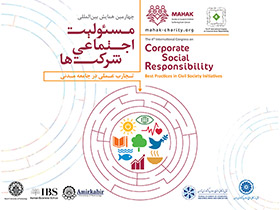 As the last speech, Ahmad Pourfallah, the member of Board of Trustees, Senior Advisor of Iran Chamber of Commerce, Industries, Mines and Agriculture and also the secretary of the congress recited congress’ statement and stated:
As the last speech, Ahmad Pourfallah, the member of Board of Trustees, Senior Advisor of Iran Chamber of Commerce, Industries, Mines and Agriculture and also the secretary of the congress recited congress’ statement and stated:“Population growth, industrialization and increasing social problems have led to a transition from traditional approach to charitable acts to a systemic one towards helping fellow human being.
Due to complexities of today’s societies, the governments cannot be in charge of all societal concerns. As a result, there has to be some form of non-governmental organizations to take necessary actions for the issues that governments cannot assume full responsibilities for. The concept of ‘Social Responsibility’ has been formed based on this requirement and gradually evolved to the point where today it has become one of the key areas of Chambers of Commerce’s activities as the base for entrepreneurs and business agents.
MAHAK is an organization established with the superior motive to serve humankind and the mission of supporting children suffering from cancer so families have few other concerns but their child’s treatment process, and that the children with cancer can handle their treatment process with more content and hope. During its quarter century of activity, MAHAK has consistently given special consideration to the concept of “Corporate Social Responsibility.
Help and support of our benefactors, devotion of our social workers and your contributions either individually or on behalf of an organization like Iran and Tehran Chambers of Commerce, has assisted MAHAK to achieve its long and short term goals. MAHAK’s reputation has crossed the borders by obtaining recognition in the form of precious awards which reassures MAHAK and all its supporters around the world that it remains on the right track.
MAHAK assumed a pioneering role among NGOs in promoting CSR from its first Strategic Plan developed in 2010. It has attempted to draw attention of business entities to the concept of Social Responsibilities and promote CSR in the society by holding biennial congresses focusing on different aspects of this concept.
In line with MAHAK’s vision statement which commits to supporting cancer-stricken children’s families while ensuring that no child with cancer is ever refused comprehensive treatment due to poor financial status, this organization attempts to guide other charity organizations that share a similar concern regarding Social Responsibility to develop systematic and practical methods for instilling the culture of corporate social responsibility among corporate entities.
We hope that business entities consider social responsibility as an integral and sustainable part of their annual programming in order to achieve their celestial and humanitarian goals for reducing the challenges families face in dealing with ailments of cancer-stricken children.”
